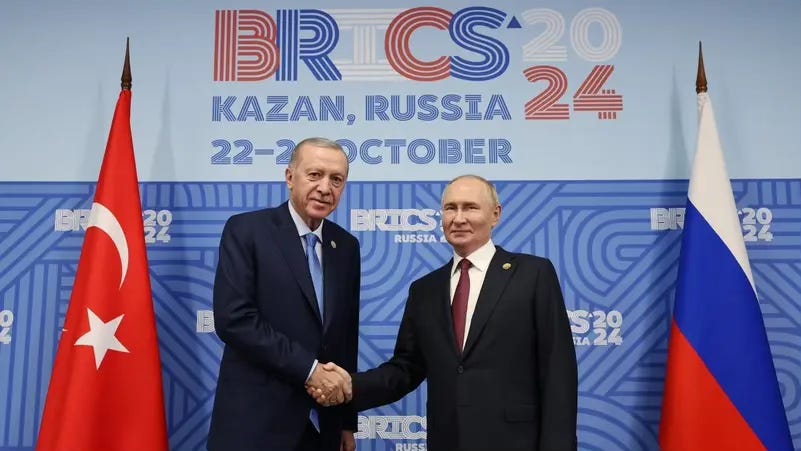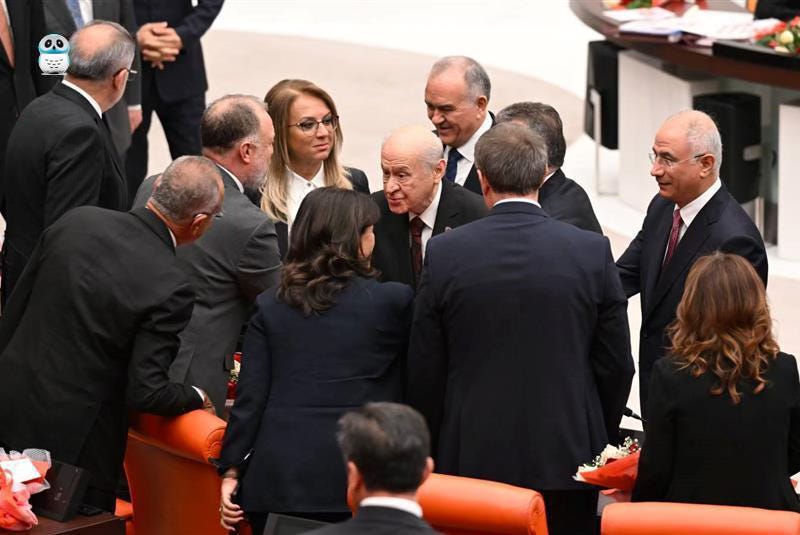Turkey and the Kurdish issue : Everything everywhere all at once
As Turkey embarks on a potential new Kurdish peace process, a terror attack unfolded. How do Erdoğan's pragmatism and the PKK's shifting strategy intersect? The stakes have never been higher.
The standing joke among journalists covering Turkey is that what happens in a year in Sweden takes place in Turkey between breakfast and lunch. No offence to our colleagues in their hygge-inspired Scandinavian newsrooms, with their cushy social benefits and far freer media landscape—but this is the daily chaos and stress journalists in Turkey are up against – we believed.
However, even those of us deeply accustomed to this relentless pace can still be caught off guard by the sheer speed of major events unfolding. When the tectonic plates shift in Turkey, maşallah, they really do move.
In the past two weeks, there have been rumblings from the AKP about rekindling the Kurdish peace process—a late but welcome shift.
During the opening of the Turkish Parliament’s new legislative session, President Erdoğan stressed the importance of unity amid efforts to sow division. He urged the nation to fortify its “domestic front,” particularly in the face of Israel's aggression, where, in his view, internal and external harmony should eclipse conflict.
Then came an unexpected moment: Devlet Bahçeli, the hawkish nationalist leader of the AKP’s hardline ally MHP, walked over to members of the Kurdish party—whom he routinely labels as ‘terrorists’—and shook their hands.
He did, what?!
A lot of us did a double take. It felt like a sign that maybe, just maybe, something was brewing in terms of a new peace process.
The opposition, for its part, indicated support if the state decided to move forward with such an initiative. In fact, the opposition leader even visited Selahattin Demirtaş, the former head of the Kurdish movement and arguably its most influential political figure, still imprisoned.
While we were dissecting the "what" and "why" behind Ankara’s maneuvers and Kurdish responses, news broke that Fethullah Gülen—the exiled leader of the Gülen movement (now branded a terrorist organization, FETÖ)—had died in his Pennsylvania mansion. Suddenly, questions of what would happen to his network, and how his death might impact Turkey-US relations, rushed to the forefront. Gülen's extradition, after all, had been a major thorn in Turkey-US ties ever since the failed 2016 coup attempt, which Ankara firmly believes was orchestrated by the Gülenists. A rare occasion where I fully agree with Ankara!
Amid this swirl, Bahçeli took centre stage again, and in a move that froze even his own supporters for a second, called on Abdullah Öcalan, the PKK leader imprisoned for 25 years, to speak at the DEM Party group meeting in the Turkish Parliament. He suggested Öcalan should declare an end to terrorism and formally dissolve the PKK. If Öcalan did this, Bahçeli hinted, legal pathways could be opened for the use of the “right to hope”—a law allowing life-sentenced prisoners the possibility of release after a re-evaluation of their case.
He said, what?!
Yes, Bahçeli—who only ever refers to Öcalan as a “baby killer” or “terrorist chief”—just invited him to the National Assembly.
While we were still processing these surreal developments, a brutal terrorist attack struck an institution 40 km from Ankara, TUSAŞ—a state-owned aerospace company. The attack claimed five innocent lives, and according to Turkey’s Interior Ministry, it was carried out by two PKK militants. In response, the Turkish military swiftly targeted 47 locations in Iraq and Syria, allegedly linked to the perpetrators; that is PKK’s top leaders’ stations Northern Iraq and Syria - Kobane.
As if the plot couldn’t thicken further, Öcalan’s nephew, DEM MP Ömer Öcalan, tweeted that he had finally been granted permission to visit his uncle after four years of isolation.
According to him, Abdullah Öcalan said he had the “theoretical and practical power” to move the Kurdish conflict from a battlefield of violence to a platform of legal and political resolution. Yet, little did he know, his organization was about to execute an attack that would make everyone—Öcalan, Erdoğan, and Bahçeli—look like they were utterly out of sync with the reality on the ground.
But then again, who really knows what's going on here? That’s the crux of the problem: the landscape is murky, and the region even more so.
Let’s try to piece together what we do know—and what’s being whispered in Turkey.
WHY NOW ERDOGAN

Why now? Why have Erdoğan and his zealous ally Bahçeli suddenly decided to extend an olive branch to the Kurds—a group whose political party has been relentlessly persecuted for the past decade? Mayorships stripped, replaced with corrupt AKP stooges, their most prominent leader, Selahattin Demirtaş, languishing in prison despite ECHR rulings in his favour. Why now, when their stance on Kurdish political movement has been nothing short of ruthless repression?
There are two possible explanations.
First, Erdoğan has his eyes set on the 2028 election. However, under the current constitution, he can’t run again—this would be his fourth term, and without a constitutional amendment, he’s out of the game. And who does he need to amend the constitution? The support of the Kurdish DEM party in Parliament.
This theory leans heavily on Erdoğan’s signature brand of pragmatism and obsession with clinging to power. It suggests that what we’re seeing is not a sudden surge of goodwill, but a calculated move to secure his political future—once again turning the Kurdish issue into a bargaining chip in his own survival strategy.
Erdogan fears that Israel's plans to ‘remake the Middle East’ might involve destabilizing Turkey. He has repeatedly stated that "the Israeli leadership, driven by the delusion of 'promised lands,' is acting with pure religious fanaticism. After Palestine and Lebanon, mark my words, the next target will be our homeland. Right now, all calculations are centered on this." Whether he genuinely believes that Israel will somehow attack Turkey is unclear. As absurd as it may sound, the Middle East is evolving rapidly, and this inevitably involves the Kurds in Syria, who now control an autonomous enclave in the north, led by a sister organization of the PKK.
The theory goes that Erdogan is trying to ‘solve’ Turkey’s Kurdish issue before the US and Israel turn this soft underbelly into a strategic weapon—something I’d argue is already in play. Turkey’s folly was abandoning the negotiation table with the Kurds during the 2013-2015 peace process, leaving it vulnerable to these external dynamics.
WHY NOW THE PKK
Why would the PKK orchestrate such an attack right on the verge of a potential new process—whether it's being called a normalization process, a peace process, a solution process, a softening period, or a new era—just when their imprisoned leader had a real chance of breaking his isolation, perhaps even playing a significant role?
The two explanations for this are as follows:
Turkey’s defence and military elites argue that the PKK collaborated with Mossad and the CIA to send a message to Turkey’s burgeoning aerospace industry, which is gaining traction both in the market and the region. The claim is that Israel and the US, through this act, wanted to emphasize that when it comes to the Kurds, they must be consulted—essentially implying that Turkey needs to align with Israel and the US if the balance of power in the Middle East shifts. They point out that it’s no coincidence the attack occurred on the very day Erdoğan attended the BRICS summit, where he declared Turkey's intention to join the group. Like I said, this line of reasoning is put forth by former military and intelligence officials. Personally, I refrain from drawing such conclusions, as they veer into the realm of conspiracy and are difficult to substantiate or refute. I like a sound theory to build a sound analysis, and a sound theory must account for fallibility. However, this doesn't mean I underestimate the influence of intelligence agencies in the Middle East—my grasp of history and politics is far too solid for such naivety.
The PKK no longer trusts the sincerity of the Turkish state and doubts Öcalan’s ability to make independent decisions while under isolation and pressure. Through this attack, they sought to send a clear message: the state cannot wield the ‘Öcalan card’ whenever it sees fit, and the true negotiating figures are the PKK and PYD leaders in Iraq and Syria.
Having studied the most recent peace process (2013-2015) down to its finer details—and even written a book on the subject—I can confidently say that today’s PKK is not the PKK of 2013. Even back then, the group’s focus had already begun shifting toward Syria. With its partnership with the PYD/YPG—its Syrian branch—its battle experience against ISIS, its resistance to the Assad regime, its alliance with U.S. forces and with the establishment of autonomous canton in Northern Syria called Rojava, the PKK’s vision of itself and the Kurdish region has fundamentally changed.
How, exactly? I can’t sketch out a precise blueprint, but one thing is clear: Turkey is no longer their main focus. Had Turkey resolved this conflict a decade ago, the PKK, Öcalan, and the Kurdish political party would have been the key players across the table. Today, the table is much bigger—and far more crowded than Turkey would prefer.





That last point is really astute, about how the PKK has changed and one I havent heard addressed. I think the 2nd reason you cited for the inştiative, changing regional dynamics is Erdoğans allies (MHP) beef and the way he gets them on board for the first reason, more years in office, the only thing he really cares about.
Your news and analysis are so good as always! I am much enjoying reading your book.
From my not-very-knowledgeable USA perspective, I am thinking this is an important point you make:
"its alliance with U.S. forces and with the establishment of autonomous canton in Northern Syria called Rojava, the PKK’s vision of itself and the Kurdish region has fundamentally changed."
I think the change regarding Öcalan might have to do with how the death of Mahsa Amini and the connection to Rojava in Iranian Kurdistan has greatly destabilized her country. Since the 2023 Nobel Peace Prize, the destabilization has increased, and some leadership in her country may be realizing they made some very bad choices that are now coming to a head. That could put a focus on Öcalan individually and lead to violent reactions from other PKK factions.
Whether this is correct or not, I think it reflects a significant position in USA current government policy and some public opinion as well. In this perhaps simplistic US view, Turkey's war against Rojava has been a major problem for many years. This became even more so when Turkey's reward for its Sweden joining NATO vote concession was to enable it to intensify that war further. These events could enable Turkey to be part of the solution to the current crisis rather than making it worse.
I just noticed that Bloomberg has something now on the news about Öcalan, but it doesn't mention Iran.